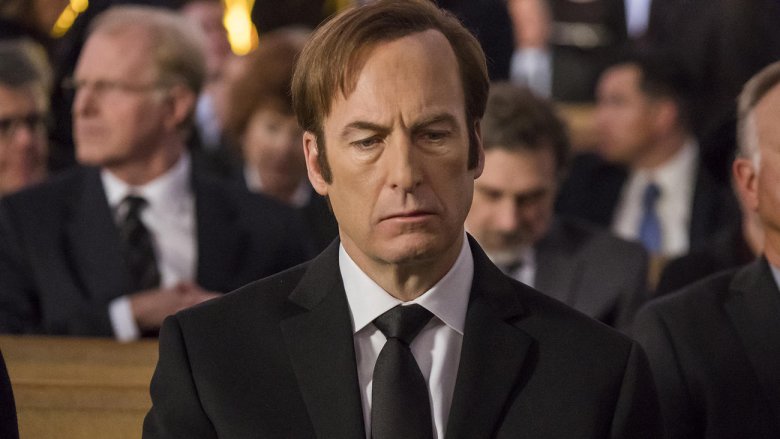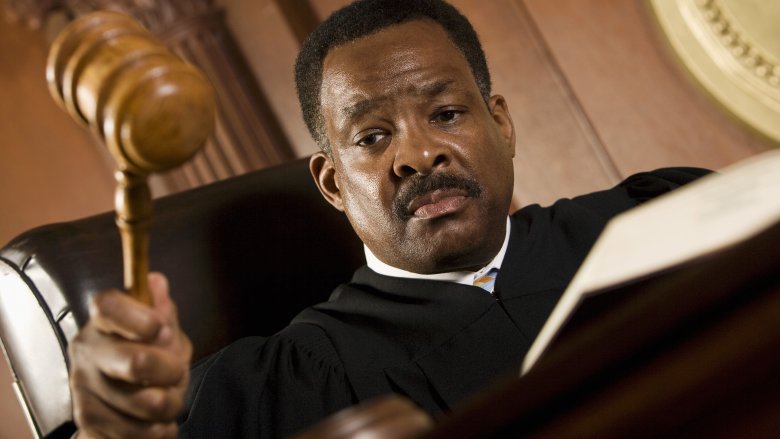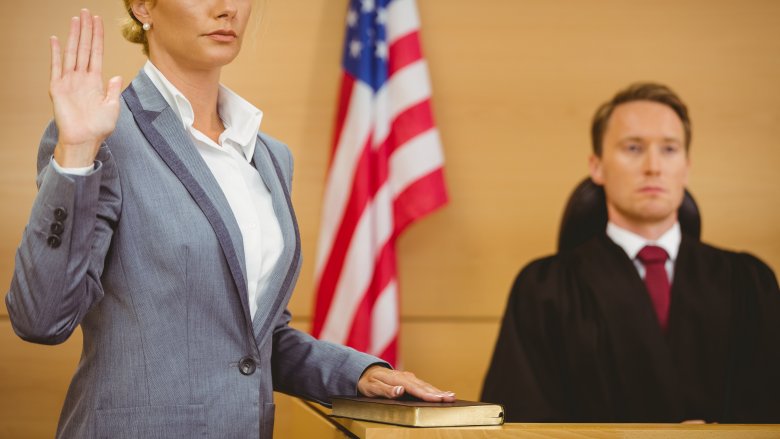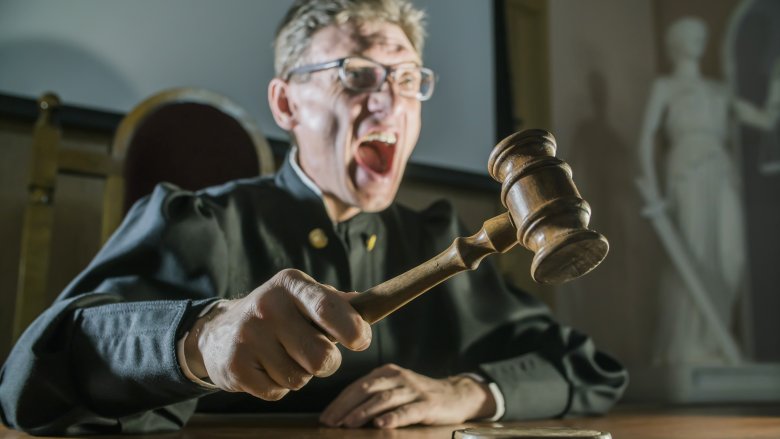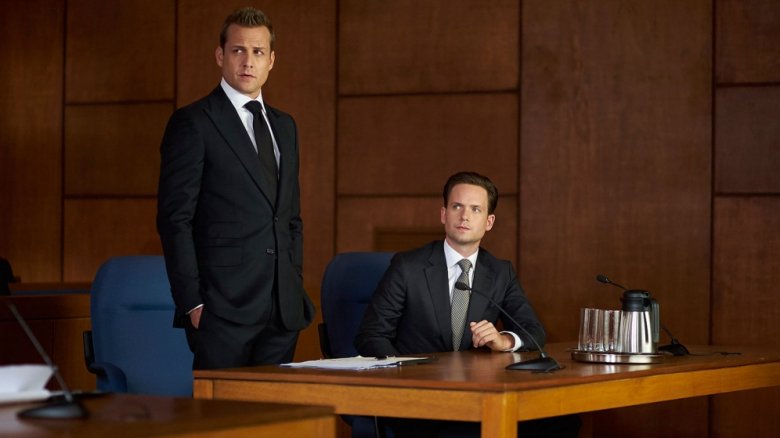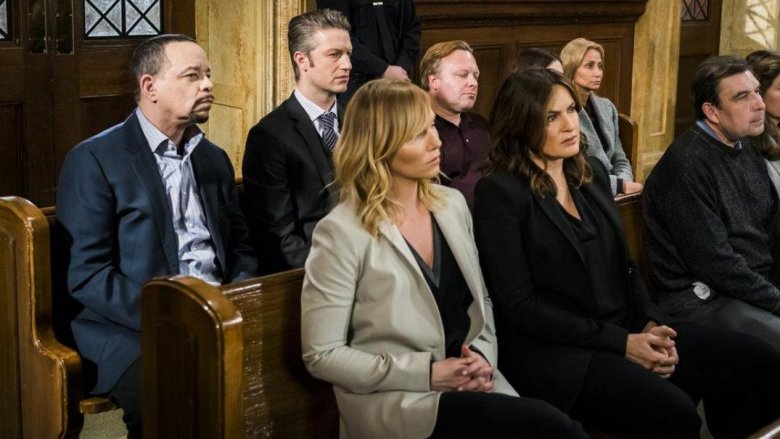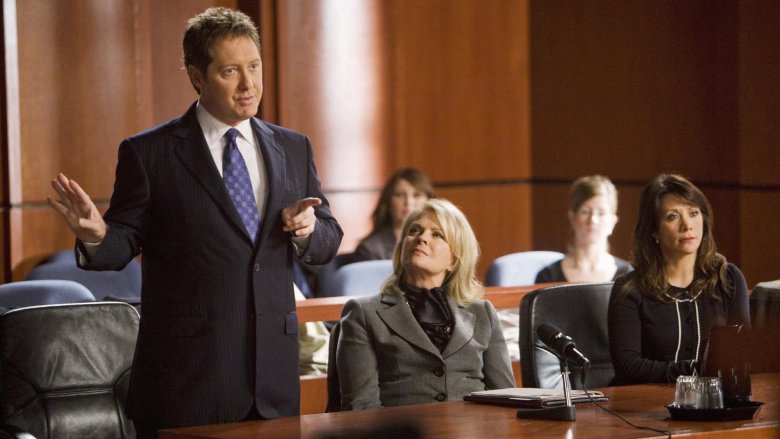False Things TV Legal Dramas Made You Believe
Whether you prefer Alicia Florrick, Matlock, or Harvey Birdman, there's one thing we can all agree on: a good courtroom drama is TV at its finest. There's nothing quite like the moment when a lawyer gives a devastating closing argument, tricks a witness into giving a surprise confession on the stand, or reveals a key piece of evidence that makes the jury gasp.
But like any genre, legal dramas have conventions. These are things that have been proven to work over the years as reliable ways of generating excitement. And as time goes on, these dramatic conventions not only become more codified, they become more exaggerated. And if you watch these shows as much as we do, this has probably influenced your ideas about the legal process in the real world. So today, let's take a look at some of the biggest myths about the law that you might believe if you've only ever seen it practiced on TV. Although justice may be blind, you probably shouldn't be.
Every case ends with a climactic trial
Just like every episode of Glee has to end with a musical number, and every episode of Power Rangers has to end with a giant robot fight, every episode of a legal drama has to end with a courtroom showdown. But how often do real world legal cases actually end up being settled with a trial? Turns out a whole lot less than Perry Mason has led us to believe. According to a 2004 report by the American Bar Association, 80 to 90 percent of civil cases settle out of court.
We know what you're thinking. "Okay, but that's just for lawsuits. Surely that number has to be lower for criminal cases?" Sorry to break it to you, hypothetical naysayer, but the percentage of cases that settle before going to trial is at least the same for criminal law, if not higher. According to the official website of the United States Court System, more than 90 percent of federal criminal cases are also settled out of court, with defendants pleading guilty as part of a plea deal.
This is pretty understandable, though. Can you imagine how anticlimactic it would be if instead of arguing with each other, the two sides of a disagreement just sat down and worked out a mutually beneficial compromise? No objections, no banging gavels, and we'd never get to hear someone say "I'll see you in court!" Frankly, that's just not a world we want to live in — or watch on TV, anyway.
A great way to win is by calling a surprise witness
When all seems lost, there is a classic ace up the sleeve that all our favorite fictional attorneys are fond of deploying, the surprise witness. Maybe they stride in at the last possible moment with their head held high, or maybe they were secretly sitting in the back of the room the entire time wearing sunglasses and a big hat, but as soon as the opposition sees them, all the color drains from their face. Sometimes one of the uptight bad guy lawyers will comment that this is "highly unorthodox," followed by the judge saying "I'll allow it," but that's usually the closest we'll get to an admission that this brand of operatic nonsense might not be the norm.
However, in real courts, one side being surprised by a witness pretty much never happens as long as everyone is doing their job. According to lawyer and blogger Rick Acker, unless a trial is happening on extremely short notice (such as in the case of an emergency restraining order), each side has to present a list of the witnesses they are planning on bringing to the stand before the trial begins, and the opposition has to have time to depose those witnesses (ask them questions under oath) before they testify.
So sorry, that loved one of yours who faked their death can't suddenly decide to return in the middle of your trial to save your bacon when things start going south. Not unless they filled out the proper paperwork first.
Good lawyers sometimes need to fly off the handle to get results
Different fictional lawyers have different ways of getting their way. Saul Goodman is theatrical. Jack McCoy is unrelenting. But one of the most timeless tactics in a fictional courtroom is a classic shouting match. One member of the court decides to give another one a little of the ol' "You can't handle the truth!" and those involved never seem to suffer any lasting consequences. Would this sort of thing fly in an actual courtroom?
The truth that legal fiction can't handle is that lawyers yelling at one another is an extremely rare occurrence. The code of conduct that you are expected to adhere to within a courtroom is highly regimented. Even an offense as seemingly minor as approaching the bench without asking permission is going to get you tackled by the bailiff.
If you are disrespectful to another member of the court, a judge will probably hold you in contempt. Although that term occasionally gets thrown around in legal dramas, many writers seem to think that it simply means that the judge is stating that they don't like you, but in a more hifalutin way. In truth, being held in contempt of court means there are sanctions put against you, often including fines and imprisonment. TheFreeDictionary.com, which hosts the full text of West's Encyclopedia of American Law, lists the official laws regarding contempt of court if you want to learn more and you happen to speak lawyer.
The best lawyers are walking encyclopedias of legal minutiae
In the TV show Suits, one of the main reasons that the protagonist, Mike Ross, is hired by the law firm Pearson Hardman is because he has an eidetic memory and an encyclopedic knowledge of the law, despite not having a law degree. And he's far from the only fictional lawyer who regularly, as a way of winning an impromptu argument, rattles off multiple paragraphs of obscure legalese. Some legal dramas treat the law the way science is treated on Star Trek. It's that thing that characters say a lot of really quickly when we can't think of a better way to solve a problem.
In truth, even if a person with these skills existed, they wouldn't even necessarily make a good lawyer. No one knows all the laws in existence, or even most of the laws in their chosen field. Lawyers read up on the relevant laws all the time in preparation for a case, not only because there is far too much law for any one mind to hold, but also because the law is always changing. According to lawyer D. James Stone, host of the Legal Eagle YouTube channel, the most important skill that a lawyer can have is being creative in their application of the law, and that requires lateral thinking, a far more important skill than rote memorization.
There's a new case every week
There's only one thing that's even more inflexible than the law: the conventions of episodic television. There's one new problem every week, it becomes the only important thing in our characters' lives throughout that week, and then it's suddenly solved, never to be spoken of again. When you try to translate this convention over to the law, however, it quickly becomes unrealistic, for two reasons.
The first reason is that real cases typically take much longer than a week to complete. It varies tremendously depending on the nature of the case in question, but according to the Criminal Law Information Blog, the general range that you're looking at from time of arrest to time of sentencing in criminal cases can vary from just a few months to multiple years.
The second reason is that most real lawyers are working on a lot more than just one case at a time, and the range on this can be equally huge. Some will have about five cases at a time, other might have 50 cases at a time. It all depends on the kind of work that they do.
It's surprising that although most legal shows have moved towards serialization, with big ongoing stories occurring in the characters' personal lives, they still typically stick to one case a week for their professional lives, when for real lawyers, the problems in their personal lives probably come and go a lot faster than their slow-moving cases.
The only lawyers that pursue new clients are low-class ambulance chasers
Practicing the law is generally the only aspect of the job that we get to see in most legal dramas, but securing new clients and maintaining relationships with old ones is also a major aspect of being a lawyer that is rarely explored in fiction.
It's not just the smaller firms that make cheesy commercials and slide people business cards. By some metrics, the larger firms prioritize the business side of the legal business even more. A study by Thomson Reuters in 2016 concluded that lawyers at "full-service" law firms (big law firms that handle all categories of legal work) spend 44 percent of their time on marketing and managing the firm, whereas smaller, "boutique" law firms spend only 17 percent of their time on marketing and management.
Some of the marketing practices that these law firms employ include not only the Mad Men style wining and dining of clients, but also sponsoring local community events, having an active social media presence, and creating free educational legal content online that links back to their law firm's website.
Lawyers will try to win by any means necessary
The stereotype of the slimy, underhanded lawyer is perhaps as old as the profession itself. There's an entire subcategory of dad jokes that have taken this premise as a given. This can't be yet another lie, can it? What's next? Is there such a thing as a smart blonde? Did the boy not throw the clock out the window to watch time fly?
Sorry, but real lawyers don't, as a general rule, only care about winning their case at the expense of the truth. Not only is this because lawyers are real human beings, most of whom have at least some type of moral code, but it's also because it's simply not a viable longterm strategy, even from a purely selfish perspective. If you falsify evidence, if you coerce witnesses into lying on the stand, eventually you are going to be caught, and then you are going to be disbarred.
As stated by law professor Rose Safarian, "Lawyers who lie do not end well. They get in trouble with the State Bar, often losing their license ... and sometimes going to jail ... It's the lawyers who play by the rules who have a long-term career ... and playing by the rules means respecting the truth and absolutely never telling your clients to lie."
Lawyers and their clients are always hooking up
Can the defense rest ... at my place tonight? Lawyers having a fiery fling with a client is a frequent well from which TV writers pull drama, but how much truth is there to that trope?
The answer is a bit more complicated than it has been for some of these other myths. Most states currently have a law on the books that prohibits a lawyer from starting a sexual relationship with a client while they are representing them. However, if a relationship existed prior to their attorney/client relationship, then it's usually allowed to continue. Strangest of all? The earliest laws that were created on this matter didn't come into existence until 2002, and many states are still just getting around to passing them — like California, which just passed its version of this ban on May 10, 2018.
So, depending on when a given episode of a show came out, the existence of a relationship between an attorney and a client may or may not have been legal. Things are moving in the direction of this being a no-no, but it's somewhat of a gray area for now. So there may still be some question as to whether or not your defense lawyer... can get you off.
